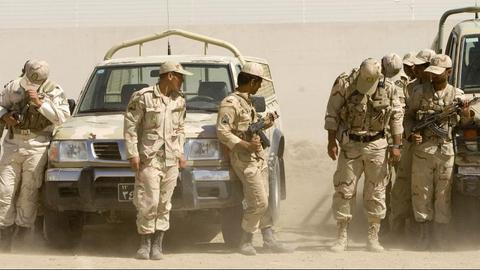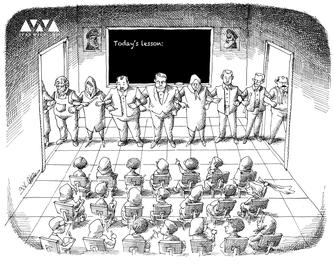At dawn on Tuesday, October 16, a separatist Baluchi group abducted 14 border guards and military personnel near the town of Mirjaveh in the southeastern province of Sistan and Baluchistan. A day later, the Revolutionary Guards announced that the men had been taken to Pakistan. The group Jaish al-Adl, which Iran classifies as a terrorist organization, claimed responsibility for the abduction and its spokesman announced that it was an act of revenge for the oppression of Sunni Muslims. According to the spokesman, the abductees are members of the Revolutionary Guards and the police.
General Mohammad Ali Jafari, commander of the Revolutionary Guards, said that “insider” agents of the terrorist group were responsible for the abduction. He did not elaborate on this claim, but Fars News Agency, which is affiliated with the Guards, said there were reports that Iranian forces had eaten poisoned food before being captured and taken to Pakistan.
Mirjaveh, with a population of less than 10,000 according to a 2016 census, is only three kilometers from the border with Pakistan, and has links to Pakistan’s railway system. It is regarded as one of the most underdeveloped cities in Iran, whereas Taftan, a town directly across the border in Pakistan, has witnessed an impressive growth in recent years.
Mirjaveh has an extremely impoverished economy due to both its geographical location and because of neglect by the central government. Because of the city’s widespread poverty, joblessness, and a big gap between demands for jobs and available opportunities, the government of the city is seen to have very little legitimacy.
Mirjaveh [Source: Google Maps]
The desert climate and the meager rate of rainfall greatly contribute to the economic suffering of the inhabitants and to Mirjaveh’s extremely weak infrastructure. There are no industries to speak of and, when added to the absence of law and order, this makes it difficult or sometimes impossible to find legitimate and productive jobs. As a result, the inhabitants have to do with insufficient incomes or resort to drug or fuel smuggling to survive.
Living Off Barbed Wire
At the same time, the population has increased, stretching the very limited economic opportunities and services even further. Poverty has grown so widespread and become so engrained in Mirjaveh that, according to a police report, “stealing metal obstacles on the borders like barbed wires and fences and selling them in Pakistan as scrap metal, as well as human trafficking and the smuggling of arms and explosives...have become normal and everyday activities” in the city. [Click here to link to the report. However, readers outside Iran may find they are denied access.]
The police report analyzes the poverty and the multitude of problems facing the inhabitants of Mirjaveh and also presents details that are rarely reported by the media. “Lack of respect for the law, the ethnic and religious bonds of citizens on both sides of the border, condoning of smuggling as legitimate by religious leaders and the influence of the smugglers on various executive and judicial bodies...have made the job of keeping law and order extremely challenging.”
The report is direct in its language and declares: “Drugs have turned into a blessing for the jobless, the poor and the needy inhabitants of the border area,” while acknowledging that the drugs trade has turned into “a serious problem” for people in other parts of Iran. It adds that the number of police in Mirjaveh is inadequate and many of the policemen working there, native and non-native, are seeking transfers to other locations. The non-native policemen, says the report, consider their assignment to Mirjaveh as “serving a deprived and difficult” area, and want to be transferred out of the area after serving their allotted time, and sometimes even before that.
The official statistics released by the police show that 30 percent of the national police employees in Mirjaveh have served in the city for less than a year and 49 percent for less than four years. In other words, close to 80 percent of police employees in Mirjaveh have not served in the city for long. The report also stresses that the policemen in Mirjaveh are “inexperienced and young and lack the necessary skills and efficiency to do their jobs.” What is more, “they lack high motivation for service” and are isolated in a deprived area.
No Borders
“The inhabitants of this border area do not recognize the borders and easily frequent both sides of the border without permission,” says the report. It lists the problems the people of Mirjaveh face, and the actions they take to cope with their situation, including drug and fuel smuggling, human trafficking and armed action against the central government.
Iranian police officials maintain that in the last 40 years, at least 2,000 policemen and border guards have been killed in the province of Sistan and Baluchistan [Persian link]. Since May 2017 there have been three incidents in Mirjaveh alone, including the kidnapping on October 16. At least 16 border guards have lost their lives between May 2017 and October 2018. In April 2017, terrorists killed 10 border guards in Mirjaveh in an armed clash, for which the group Jaish al-Adl took responsibility — the same group that claimed responsibiity for the recent abduction.
Iranian authorities say militant groups operate from safe havens in Pakistan. Fars New Agency quoted foreign ministry spokesman Bahram Ghasemi as saying that the Pakistani ambassador had met with officials at the ministry. Iran urged Islamabad to “use all possible means, without any delay” to free those abducted. “We expect Pakistan to confront these terrorist groups that are supported by some regional states, and immediately release the kidnapped Iranian forces,” said the Revolutionary Guards in a statement.
“Both militaries, under a joint mechanism established since last year, are working to ascertain the whereabouts of Iranian guards,” Pakistan’s foreign ministry said in a statement.
It remains to be seen whether these statements and responses will lead to any tangible results.
Related coverage:
Living on the Margins in Iran: Chabahar and the Province of Sistan and Baluchistan, September 6, 2018
Why Is Iran the Chosen Pathway for Human Traffickers, July 16, 2018
Sunni Cleric: Fight Extremism by Ending Discrimination, June 9, 2017
, January 13, 2015
visit the accountability section
In this section of Iran Wire, you can contact the officials and launch your campaign for various problems

























comments